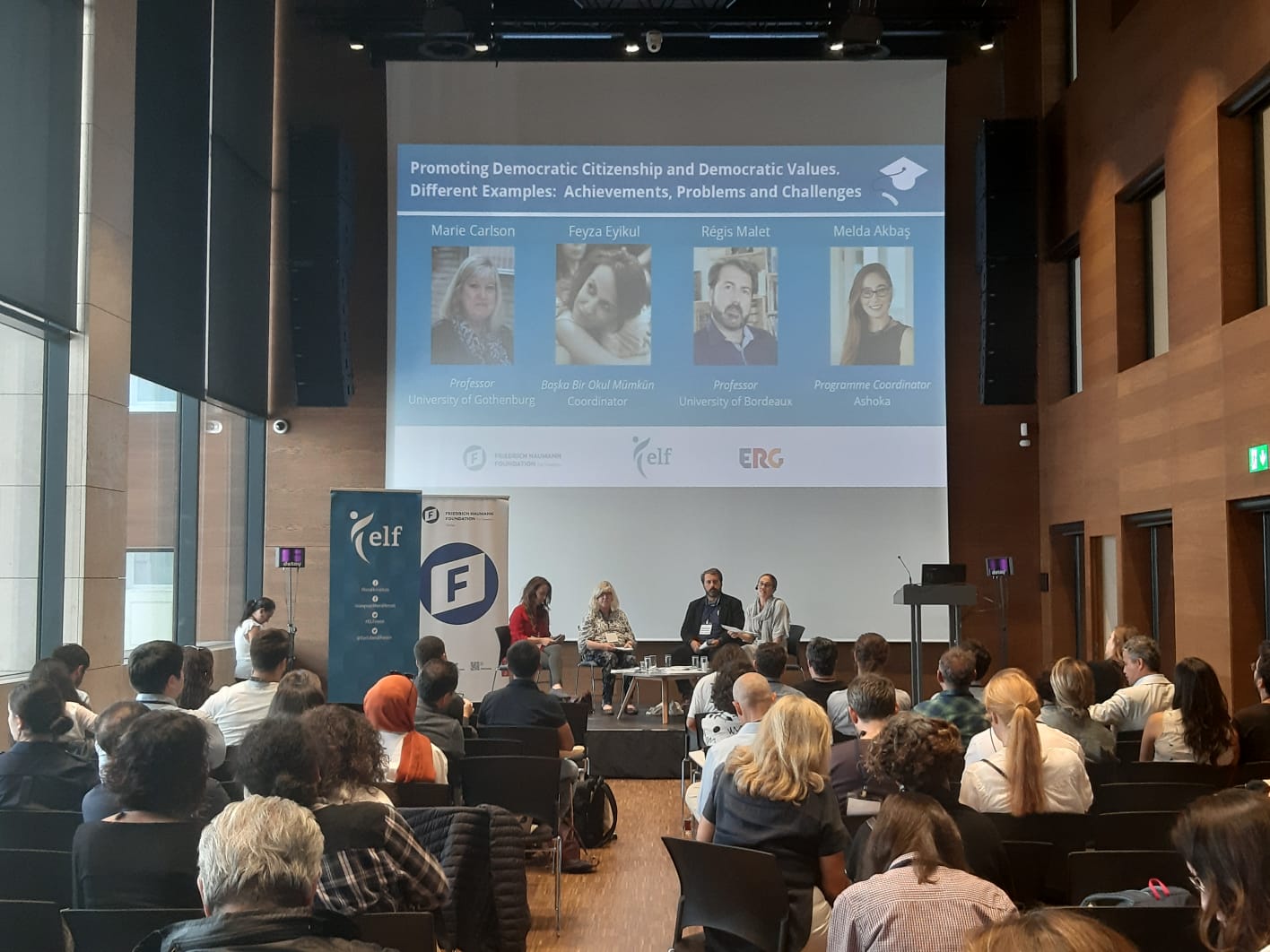Promoting Democratic Citizenship and Democratic Values

“Democracy has to be born anew every generation, and education is its midwife.” The philosopher and educational reformer John Dewey realized this fact already one century ago. Today, it seems, democratic education plays only a background role, if any, in school curricula in Turkey and many other Countries. Mathematics, chemistry, and physics, music, sports and arts, languages and history – the general curriculum is wide and diverse. Yet, you can hardly find the subject “democracy” in there. But in countries which have apparently strayed away from the path of democracy, education on democratic values and citizenship is all the more important. To assure such a democratic education, the joint effort of teachers, education researchers, NGOs and officials is required. First, to make sure that democracy is taught at all and second, to guarantee that it is taught in a participative, sustainable way. Students do not only have to learn about democracy, the aim is to let them experience and internalize it. Thus, for teaching children to actively participate in society, building up of theoretical and practical knowledge is key. For this purpose, a number of education stakeholders came together in Istanbul on 27 September 2019 to discuss the requirements of democratic education and share best practices of promoting responsible democratic citizenship.Organized by the European Liberal Forum with the support of Friedrich Naumann Foundation for Freedom Turkey Office and the Education Reform Initiative, experts discussed positive and negative examples of democratic education and school governance. Besides, they exchanged innovative methods and extra-curricular activities to implement concepts of participative citizenship, critical thinking, tolerance and freedom rights under the topic: “Promoting Democratic Citizenship and Democratic Values through Education”.
Under the moderation of the journalist Nevşin Mengün from Deutsche Welle Turkey, the panelists pursued the question why education is of central importance for democratic citizenship. Professor Tülin Şener Kılınç from Ankara University and Lana Jurko, Executive Director of the Network of Education Policy Center emphasized that democratic participation cannot only be taught, it has to be lived. Democracy and democratic education are all about participation – this was the key message of the first panel session. In the second session under the moderation of Murat Günel, the General Director of Koç Schools, Turkish panelists discussed Turkish curricula, textbooks and school environments und the question: “How are Democratic Citizenship and Democratic Values Addressed in the Turkish Education System?”. Here, the researchers Sezen Bayhan and Canan Aratemur Çimen from Boğaziçi University’s Education and Policies Research Centre, Işık Tüzün, the Director of the Education Reform Initiative and Professor Suna Aydemir pointed out many weaknesses in the teaching of democratic values and participation in the Turkish education system. They emphasized mainly a lack of information on democracy, citizen and freedom rights as well as a missing empowerment and real participation of students in school governance. In the last panel under the moderation of Ashoka’s Program Coordinator Melda Akbaş, experts from three countries - Professor Régis Malet from the University of Bordeaux in France, Professor Marie Carlson from the University of Gothenburg in Sweden and Feyza Eyikul from the organization “Başka Bir Okul Mümkün” (Another School is Possible) in Turkey, talked about different examples of achievements, problems and challenges in the promotion of democratic citizenship. They concluded that democratic education should on the one hand be adapted to the local and historical contexts of each country but at the other hand strive for the promotion of democratic values and education beyond national borders.
Every panel was followed by lively discussions between the panelists and the audience. The large number of questions and comments showed that the topic of the conference touched a nerve and that there is a large desire of education stakeholders to exchange their experiences and learn new methods for democratic education from each other. One of the main messages of the conference was that democratic education is all about participation and what happens in the classroom. Teachers actively challenging and supporting the democratic education of their students are an indispensable condition for that. Seeing so many engaged teachers interested in the improvement of their methods and teaching on democratic education during the conference is a good indicator that this can be possible in Turkey.
The conference was followed by a two-day workshop during which teachers, researchers and education activists. They took the inspirations of the conference and directly started working together on ideas and methods to improve democratic education in Turkey. With such a high level of motivation, we can be optimistic for the future of democratic education in Turkey!